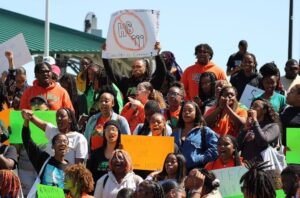
Florida House Bill 999 has been a hot topic on the campus of Florida A&M University since it was introduced earlier this year.
The bill, signed into law by Florida Gov. Ron DeSantis, prohibits the expenditure of public university funds on diversity, equity and inclusion [DEI] matters.
Many have questioned how the nation’s top-ranked public Historically Black College/University plans to carry on when its rich legacy, culture and history have been targeted by the law.
FAMU was established in 1887 as the State Normal College for Colored Students. Since then, the school’s purpose has been to improve the lives of its students through higher education.
The university also ranks No. 21 on the social mobility index, that is, the dedication of a university to improve the economic trajectory of its students who are often first-generation college students or from low-income areas upon graduation.
With all of this in mind, many are curious to see how the university adapts to this new law. Though the legacy of FAMU cannot be reversed, not much has been said about its classroom culture.
All FAMU students are required to take at least one Afro-centered humanities course. Have humanities professors resided on the side of caution when teaching and discussing diversity, equity, and inclusion topics?
Nyabi Stevens, a senior psychology major, says she has noticed no difference since the bill was passed. She is taking a course on the psychology of racism and prejudice.
“I have noticed no shift in the conversation. It is extremely hard to divert and not converse about the African-American experience at an HBCU. FAMU’s Department of Psychology is African-centered, meaning there is no room for European ideology except when we compare and contrast them. My professors do not shy away from African theology and identity because of someone, DeSantis, not being comfortable with the history of civilization. We can’t not talk about our history, for it makes us who we are. If there are professors in my field who do not try to talk about it then they single-handedly are helping DeSantis take away from the program and education of our future African-American leaders,” Stevens said.
Tre Byrd, a junior psychology major, shared her experience as a student in the College of Social Sciences, Arts and Humanities. She has previously taken a course on Black psychology and is currently enrolled in an African humanities course. Though she has not noticed a shift within her classes, she believes the bill could begin to impact the way diversity, equity and inclusion matters are discussed and implemented.
“Professors continue to teach the same. They see the climate and the way the world is going and make it their mission to teach us the important things regardless of the changing laws because they know we need this information now more than ever… Some professors may shy away from certain topics to protect themselves and their jobs, but most psychology professors are strong-minded and won’t let anything stop them from educating the Black youth,” Byrd said.
Associate Professor Allezo Nevell Owens has been teaching at Florida A&M since 2006 and notes no difference within his classroom since the passing of HB 999. A few of Owen’s classes include Black religion in America, women and religion, personality and race, and religious traditions of Africa.
“As one who teaches the facts and not speculation, regarding the impacts of racism and patriarchy on Black people and women in religion, especially Christianity, I am not bothered by the law. Neither the structure nor how I approach my discussions have changed … I teach the facts of the impacts of racism and gender/sex discrimination… Based upon those facts, I entertain any reasonable theories for discussion, even theories that some may not find palatable,” Owens said.
FAMU has been dedicated to educating African Americans and embracing all dimensions of diversity since its establishment. Law or not, students and professors are not willing to reverse 135 years of academic excellence by excluding diversity, equity, and inclusion matters from their classrooms.